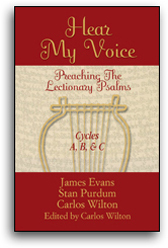SermonStudio
Proper 20/Pentecost 18/Ordinary Time 25
Preaching
Hear My Voice
Preaching The Lectionary Psalms for Cycles A, B, C
(See Proper 12/Pentecost 10/Ordinary Time 17, Cycle A, for an alternative approach to vv. 1-11, 45b; and see Proper 14/Pentecost 12/Ordinary Time 19, Cycle A, for an alternative approach to vv. 1-6, 16-22, 45b.)


